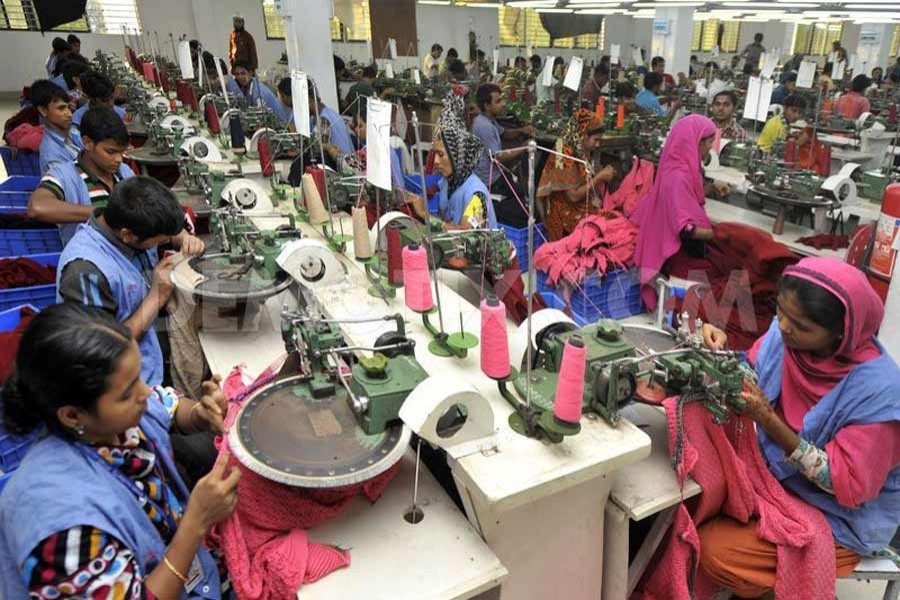A recent survey conducted by the IndustriALL Bangladesh Council (IBC) found that 64 per cent of readymade garments (RMG) workers were unable to meet their daily expenses with the monthly wages they receive. The minimum monthly wage of a RMG worker is now Tk 5,300 a month.
In such a situation, one does not expect them to save money for the rainy days which usually come aplenty in their lives. The results of the IBC survey, thus, noted that almost none of the poor RMG workers had any savings. Rather, all of them had debts either to relatives or to small money lenders.
The survey was conducted on 850 RMG workers in Dhaka and its adjacent RMG industrial hubs and in Chittagong. The survey also found that nearly three-fourths of workers do overtime to meet the gap between their wages and spending on daily necessities.
The survey results are not anything startling, for the situation of the RMG workers' wages is known to all. It is not possible to carry on with life with this paltry earning. The workers, more than 80 per cent of whom are women, do not consider their monthly wage just an earning. They consider it a symbol of their own social and economic emancipation. These women could earn an amount at least twice their wages working as domestic help. Yet they are continuing with their low-paying RMG jobs.
None but the employers dictate the job market in Bangladesh, be it for educated or uneducated people. So, it is quite obvious that employers in the RMG sector would impose their terms on workers, the majority of whom are unskilled and belong to poorer sections of society.
But should the workers of an industry that fetches the bulk of export revenue of the country be so poorly paid? More than 80 per cent of the country's export earning comes from the apparel sector.
The RMG owners would say they cannot afford more. They argue that buyers who do very often talk about compliance issues behave miserly when it comes to increasing the value of the products that they source from Bangladesh. That is partly true. The buyers must also have reasons for not increasing their procurement price. They are buyers, not distributors of dole money. In that case, they should not raise the compliance issues just because the consumers of their own countries are conscious of workers' rights and safety. The consumers should also be ready to pay a reasonable amount against their purchases so that apparel unit owners in exporting countries can pay reasonable wages to their workers.
One of the major reasons for Bangladesh becoming the second largest exporter of apparels in the global market is its cheap labour. Some other leading apparel exporting countries that were close to Bangladesh, in terms of labour wage, have raised their labour wages. The situation has forced the factory owners of these countries to hike wages.
But that is not happening in Bangladesh, in real terms. The wages of the RMG workers have also increased here, but not up to the desired level.
Garment owners usually abhor workers' wage issue. They have always been very sensitive to it. But, surprisingly, the Bangladesh Readymade Garments Manufacturers and Exporters Association (BGMEA), the top trade body of the apparel makers, recently requested the government to form wage board with a view to revising the wages of the apparel workers.
This is a good move, no doubt. But, surely, it has something to do with the slowing of exports to some traditional and major destinations of Bangladesh apparels. The EU which has always maintained a soft approach towards Bangladesh exports, including RMG, is increasingly changing its attitude and demanding necessary compliance from the latter on workers' rights and safety issues. The USA has always been tough on the workers' rights issues.
It would be, however, appropriate on the part of all stakeholders to keep in view the real cost of living while deciding on the minimum wage for the RMG workers. According to the latest government pay scale, a cleaner, who is placed at the lowest tier of the salary structure, gets a minimum monthly gross pay of Tk 15,250. Moreover, as a government employee he or she enjoys some other benefits such as provident funds and pension.
An apparel worker, if seen from all social and economic contexts, should not get wage below a cleaner. But the realities in the public and private sectors are entirely different. A threefold hike in RMG workers' wages will not be possible under the prevailing circumstances. But the wage-hike should be reasonable one. Experts are of the opinion that workers be given 'living wages' so that they can lead a life as human beings. There should not be any reason to oppose such a view, for we do not want anyone to lead a subhuman life.


